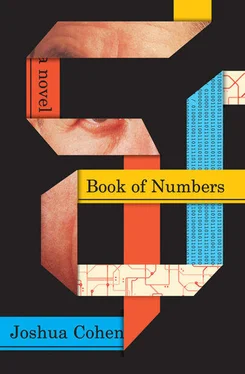But then one night or we are just imagining night one of the engineers, a Gregory Rundle L E or Rundel E L, who before Paz had worked at Samsung and after Paz would work at Samsung but demotedly, got a call from Kompf, at the office or home the same, “Your guy just came and went all flustered, requesting a recommendation letter.”
Apparently Kompf had asked what it was for but the guy said nothing beyond, “Just a letter of reference in re: evident engineering prowess and loyalty to America.” Kompf asked for his name and the guy answered he would fill that in himself and gave an address out in the 95030s that was certainly not residential. Other fusses. The letter had to come in two copies: To Whom It May Concern, and To the Honorable James A. Baker III, US Secretary of State.
Kompf typed up the letters chockfull they had to have been of praise but also conjecture.
Greg Rund EL or LE picked them up in their unsealed envelopes and took them to the address, but having brought no other offering was made to surrender the bag of macaroons he was snacking on along with a lock of his receding hair to whatever gods they had then at that Hindu mandir in Milpitas.
The Indian, who prayed there daily, was propitiated.
He was unemployed and his visa was expiring, he explained to Greg. He was amassing testimonials for his deportation proceedings in the event he was unable to find a job.
Greg then offered him a job. The interview was strictly a formality, except for the negotiation of terms, including but this might be baseless the stipulation that half his salary be transferred, concurrent with paycheck issuance, directly to the orphanage that had raised him. We do not think that orphanage ever existed. But as like with tax law, it is for others to know.
Health benefits were exercised immediately, prescriptions were obtained and cortisone shots for carpal tunnel.
He was made Associate VP of Engineering for a business that had eight other Associate VPs of Engineering.
Paz, 1989.
://
But this was beyond even him: a remote that could be programmed by purchaser alone, a remote intended to be friendly enough so that even a mentally rectarded pet child could instruct it in less than 12, 10, 8—in less than 6 steps per gadget in the widest variety of TV and VCR functionality, in the configurations of stereos and surround sounds.
It was the very breadth of that variety that inspired what we later called the Law of Moe, which states that if universality were ever possible in space and so in time, life would become utterly impossible for everyone but the patentholder.
Though Moe had other, related, formulations: “Not even the globe is global, not even the galaxy is universal, Joshua Cohen.”
Also: “The longer the search, the wider the find, Joshua Cohen.”
In each interim between his team of Pazzers designing a mod feature and testing it out, as like a Power button that turned On and Off every product made by four brands, 8 or 16 or 256 new products would be brought to market, and another consortium of bargain brands from Japan would establish another competing remote lab to coadunate proprietary specs. The Pazzers had to match each progressive advance, but even if the success rates were equal, the operations were not, and if the Pazzers were adding, the Japbrands were multiplying, and if the Pazzers were multiplying, the Japbrands were exponentiating, and this situation of a small team of good scrappy engineers vs. a big evil capitalist universe was not a fictional media property as like a ninja telenovela available on the equipment the engineers were attempting to control, but was instead real and actual and hopeless, and no intenser degree of application or polytheistic divine intervention would have helped them, or anyone, keep up.
Innovation does not wait for standards, it sets them. To innovate is to be incompatible. But business was bad. Then business was übervikram.
By 1990 Moe had clunked a multiverse of universal demos, a semiversal for audio, a hemiversal for video, a demiversal for TV, meaning that each worked on approx 50 % of each product, crossmodel and panbrand, half that percentage programmed by scanning, the other half by manual programming so serious as like to require a code glossary of function assigns grouped by model and brand that was illegal for Paz to have even compiled let alone to publish and monetize.
There was a Sharp remote with a timer mode, which allowed users to set the VCR recording of future TV shows, a JVC remote with an edit mode, which allowed users to edit recordings, both of which just a gen later would be claimed by and would enrich everyone but their inventor, and also a crossbreed Panasonic/Magnavox remote with the commsense function, which sensed commercials by their distinctive mixrates, turned channels to another show, and returned to the original show only once its commercials were over. Ultimately, Moe invented, he would always claim, or he only modified, he would never claim, 108 remotes, 108 versions of what was supposed to have been a single remote. An Amote. We just remembered what it was called, the Paz A M O T E, and some said “ah mote” and others said “ay mote,” and 108 is just a Hindu euphemism for “many,” or “much,” 108 the sum of the Upanishads, the amount of gopi or cowherds of unconditional love, the number of the beads of the mala, so the breaths of the japa, the names of each ceaseless god.
Moe needed that practice, which is Buddhist too, that counting, that numerical mantra. He needed a break. Even another job would have been a break. He was leveled. Everyone else was on permanent vacation. Always off, working remotely, taking meetings in Porsches in the middle of carwashes. Out in back of the office, his parkingspot had been taken, the entire lot was taken by a trailer that quarantined a furtive clan of Indonesian pribumi assigned to different projects. No windows. His paychecks came from Spazz, and then from Spazz Telecommunications, and with each the signature changed. We are not sure if the orphanage got its share. We are not sure in general about the orphanage. New managers were brought in and they were always on the phone. With new ownership. With parole officers.
Rund, Greg, who had returned to Samsung, got Moe a Samsung offer, generous. Other coworkers who had quit tried luring him to Canon, Nikon, Sony, and offered him equity in GPS tritels that would be so clovered by the millennium that even the receptionists would be able to platinize their lawnmowers. But Moe had not come to America just to work for Korea. Or to give suburban paleface parents driving directions between stripmalls.
Fall 1990, Moe was the sole engineer still assigned to the Amote. His manager was the son or nephew of new owner/CEO Nicodemo Merlino, who was never in the office, but then neither was the nephew or son.
Except the night before Christmas Eve, they both burst in, sweating, rushing through and clutching at cabinets and leaving a papertrail out to the lot, too panicked to notice their last legitimate employee, or so Moe would later hope.
The FBI, we are fairly sure it was the FBI that arrested the Merlinos burning files in a trashcan atop the one remaining handicapped space with enough accelerants as like diesel fuel and insecticides in the trunks of their Mercedii to torch the rest of their workplace too. All the Indonesians were taken into custody. All the descrambling illegal cableboxes they had been assembling in the trailer were seized. The Merlinos were accused of trafficking, were already out on bail posted by the virtually unindictable Emmanuel Figlia, San Jose mafia, by the time Moe finally emerged from hiding.
Читать дальше












